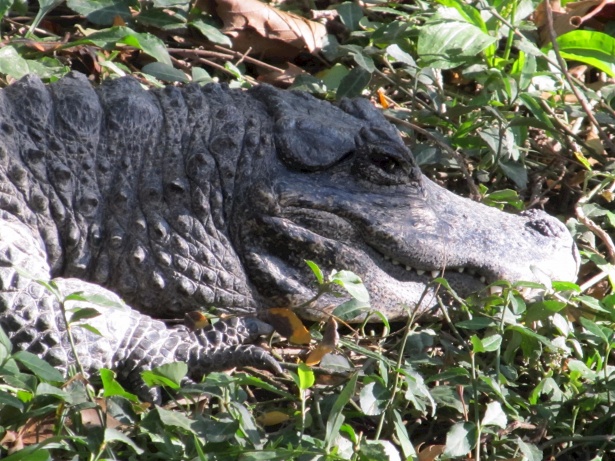ANIMAL: Chinese Alligator Alligator sinensis Type of Animal: Crocodilian Habitat: Freshwater areas (especially those w/ slow-moving water) & adjacent land nearby-rivers, streams, lakes, ponds, reservoirs, river backwater canals, rice paddies, irrigation networks, marshlands, ditches, wetlands, temporary pools, bases of mountains in areas w/ lots of grass/shrubs, areas transitioning between temperate, subtropical, & tropical, moist forests Location(s): Restricted to Yangtze River Basin area along East China Sea coastline. Formerly throughout lower Yangtze River Basin. Appearance: Black to dark gray w/ short broad snout pointing slightly upwards narrowing at the end, more armored than much larger American cousin. Food/Diet: Snails, crustaceans, fish, insects, birds, small mammals, mollusks, turtles, fruit, frogs, invertebrate larvae Status in Wild: Critically Endangered Conservation: Breeding in zoos, aquariums, wildlife parks, & breeding centers. Reintroductions into native range. Lifestyle: Mostly solitary though young can sometimes be found in small pods Additional Info: Called: Male: Bull Female: Cow Young: Hatchling Group: Pod Weight: Male: 79-99 lbs Female: 50-79 lbs Young: 2.5 lbs Gestation: 9 weeks Life Span: 50-70 years Body Length: Male: 4.9-5 ft Female: 4.6 ft Young: 0.5 ft Tail Length: 2 ft Adults have no predators while larger alligators, birds, & predatory fish prey on young. Also called Yangtze Alligator & muddy dragon. A fairly vocal crocodilian species, w/ adults bellowing during breeding season & young vocalizing to communicate w/ siblings & mom. One of only 2 species of alligator in the world (the other being the more famous American Alligator) & only member of family Alligatoridae in Old World (other members of this family are 6 caiman species of C & S America). They’ll often dig extensive earthen tunnels/burrows w/ multiple chambers, entrances, & pools. These highly useful for brumation in cooler months & as shelter in hotter weather, when they become nocturnal. Sexually mature at 4-5 years old. Highly endangered due to water pollution, hunting for meat/skin, persecution, habitat destruction, habitat conversion, dam building, medicinal trade, & natural disasters. There might be less than 200 in the wild, meaning more are in captivity than in wild. Sex determined by nest temperature, w/ lower temps resulting in mostly females & higher temps producing mostly males. Some of the smallest eggs of any crocodilian. Tend to be very shy in wild. Fun Fact(s): While bite incredibly strong, jaw muscles are relatively weak. It’s highly possible this animal was inspiration for Chinese dragon. One local name Yow-Lung or T’o in fact means dragon. Marco Polo was 1st person outside China to write about this animal.
